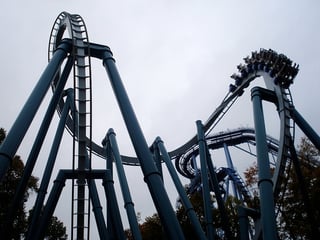 Here we go again…..up, down, up, down. If this stock market roller coaster ride has you feeling anxious, you’re not alone.
Here we go again…..up, down, up, down. If this stock market roller coaster ride has you feeling anxious, you’re not alone.
Although the market crash of 2008-2009 is now thankfully in our rear view mirror, for all of us long-term investors that hung in there through the worst of it, starting the New Year off with such high volatility in global stock markets can easily spook even the most seasoned investor.
With all this recent volatility, expect to see lots of financial talking heads making predictions. Some will be dire, some will be optimistic. But at the end of the day, these are guesstimates, at best. Take everything, especially now when emotions are running high, with a grain of salt.
Many markets and asset classes are now in a “correction”. A stock market correction is when prices fall 10% from the all-time high. But - and this is important, corrections are generally temporary price declines interrupting an uptrend in the market. It’s very normal for markets to have one, two and sometimes three corrections in one year, with markets still ending in positive territory at the end of the year.
Once markets began recovering from the 08-09 crash, what we experienced - very low volatility and strong annual performance, year after year after year, was highly unusual.
Although as enjoyable and profitable as it was, it was also dangerous because complacency can easily settle in when markets seem risk-free.
Why do I claim complacency is dangerous? Because it has a habit of causing investors to make rash and emotionally charged decisions once markets become volatile after unusually long periods of relative calm.
With markets rewarding investors so generously while at the same time seeing such low volatility, it’s easy in retrospect to now see how complacency settled into many an investor’s behavior. The remedy for this situation is the big D-discipline.
Do You Have The Discipline Needed To Stick With Your Investment Strategy?
Investing provokes strong emotions. In the face of high market volatility like we’re experiencing now, some investors may find themselves making impulsive decisions or, conversely, becoming paralyzed, unable to implement an investment strategy or to rebalance a portfolio as needed.
Discipline and perspective are the qualities that can help you remain committed to your long-term investment strategy. And yes, I know, that is much easier said than done, especially when it comes to something as crucial as your financial security.
In volatile markets, with very visible winners and losers, market-timing (getting out of the market now and at some point getting back in) is a dangerous temptation that you will face head on. The appeal of market-timing is exceptionally strong when you’re feeling over-confident or just the opposite, feeling scared.
What's key to remember if and when you’re feeling tempted to sell in this most recent downturn is this sound guidance from John Bogle, founder of Vanguard:
“Thinking you should get out of your stock allocation (1) then (2) get back in, when? You might be lucky once when you get out, but being lucky twice, knowing when to get back in? Nearly impossible odds to get that right twice."
Abandoning a planned investment strategy can be costly, and research has shown that some of the most significant obstacles you’ll deal with as you do your best to stay on track with your plan are behavioral: the temptation to chase performance, the allure of market-timing and the failure to rebalance.
Practice makes the master. Now’s your time to practice and flex your discipline muscle.
Buckle-Up
All indications are that 2016 will potentially be a very volatile year in global stock markets, so please prepare yourself for that, buckle up, and do your best to find your sanctuary from the noise. Although we can’t control the markets, we can control our response to what’s happening.
By being in control of your emotions, instead of the other way around, you’ll not only increase your resilience to these ups and downs, you’ll increase your self-confidence which in turn will help you stay on track with your investment plan when the going gets rough.
As I mentioned in the title of this blog, a market decline is temporary while selling at a loss is permanent. If the Vanguard S&P 500 fund that cost $190/share earlier in the year is now ‘on-sale’ for $172, from my perspective, that’s not a crisis to sell, that’s an opportunity to buy.
And as the “Oracle from Omaha”, Warren Buffet likes to remind us:
“Be Fearful When Others Are Greedy and Greedy When Others Are Fearful”
Photo credit by Felicito Rustique

